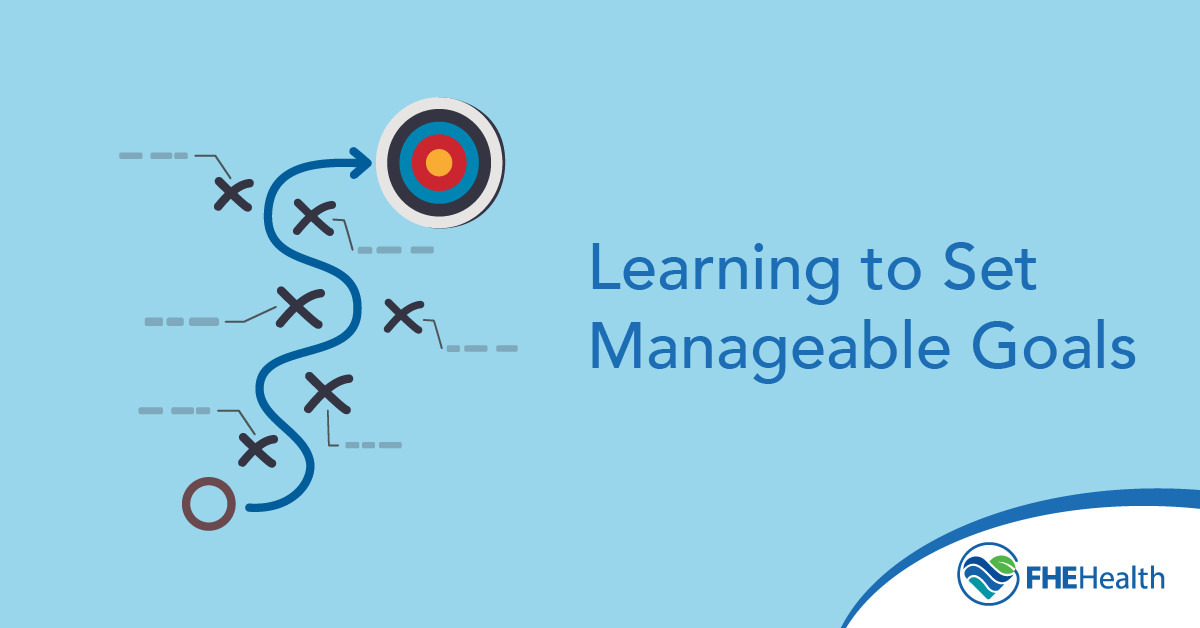
As each new year begins, many of us determine the goals and changes we’d like to achieve in the coming 12 months. While there are several common themes, including weight loss, healthy eating and exercising more often, mental health goals are curiously missing from most lists. Setting mental health goals along with physically oriented ones can help you create more comprehensive and positive life changes, even if you start well after New Year’s Day.
What Are Mental Health Goals?
In a 2022 article, the National Health Service defined mental health goals as aspirations to “improve your mental health and well-being.“ While this is a very broad definition of goals to improve mental health, five areas of focus are offered as examples you can use to create your own:
- Personal connections. Achieving this may be as simple as making conscious, meaningful contact with friends and family on a regular basis. Remember, digital-only connections such as texting or emailing don’t hold the same weight or benefit as face-to-face time spent with loved ones, so balance is important.
- Physical activity. Being physically active involves more than just getting exercise. It’s the precursor to making important mental health-supporting life choices such as cleaning up your surrounding environment, getting important tasks accomplished and even going outside to enjoy fresh air and sunlight.
- Learning new things. Keeping your mind healthy requires challenging it on a regular basis. Taking up a new hobby, language or skill ensures you’re priming your mind to remember important things through a process called neuroplasticity. The U.S. Department of Veterans Affairs points to the unconscious memorization of a frequently used phone number as an example of neuroplasticity in action.
- Helping others. In a 2023 U.S. Census Bureau report, 28.3% of respondents indicated they participate in formal volunteering, which makes it a popular way to help others. By helping someone else, you get the benefits of valuable human contact and physical activity and the mental health rewards of doing a good deed.
- Practicing mindfulness. With so much pressure to worry in advance about everything ranging from bills to health issues, it can be difficult to keep your thoughts in the present moment. Doing so through consistent practice, however, can help lower anxiety and ensure you’re making logical, healthy choices from a place beyond the looming, uncertain pressures of the future.
Setting Mental Health Goals: Short-Term vs. Long-Term
To distinguish between short-term vs. long-term mental health goals, try reframing each one as specific (I will do X by Y) or broad (I’d like to improve/enhance X sometime in the next Y). Having a mix of the two types of goals helps you establish a long-term roadmap for success with your emotional health goals.
For short-term goals, it’s important to be reasonable and logical. If you’ve struggled to do something consistently — or at all — for many years, it’s probably unreasonable to assume you’ll achieve it in the next month. Give yourself grace for past stumbles, and don’t dwell on them. Instead, break goals into smaller, more manageable tasks.
For example, if you deal with a lot of clutter and struggle with housekeeping maintenance, having a goal of cleaning the entire house in the next week may be overwhelming. Instead, set smaller goals, such as cleaning out the pantry cabinet by a certain day. Setting a specific goal makes it more manageable and achievable in a short period of time.
Completing each small task helps you build confidence and motivation for tackling the next one. So, if your long-term goal is to clean the entire house, completing multiple short-term goals can allow to you to achieve it in a reasonable amount of time.
How to Track Mental Health Progress
With physical issues such as high cholesterol or blood pressure, specific medical tests and tools can help you see your progress or manage areas of concern. Your mental health care progress can be tracked through ongoing therapy appointments with a mental health professional. Periodic talk therapy appointments, for example, allow your provider to note and discuss your concerns, obstacles and wins as an impartial outside observer. We’re often our own biggest critics, so getting reassurance and reminders from a professional can help overcome any negative self-talk.
Journaling offers an excellent way to keep an eye on your mental health progress between therapy appointments. You might use a physical journal you write in to keep track of your mood each day, a smartphone app where you record your emotions with the same frequency or a bullet journal, in which you simply color in a grid block with a corresponding emotional hue.
How to Set Manageable Mental Health Goals
Just writing down your goals isn’t enough. You need to create a plan detailing how you’ll achieve each goal. These tips can help you get started.
Create Actionable and Manageable Goals
Stating you want to lose weight isn’t effective because it’s not actionable or measurable. Instead, state what you’re going to do to lose weight.
For example, your goal might read, “I’ll lose 10 pounds a month for the next 3 months.” Then, outline how you plan to accomplish it. “I’ll follow a low-calorie diet with more vegetables and fewer carbs.” You can (and should) break down the goal even further.
This ensures you know where you’re starting, what you’re going to achieve and how you’ll measure the results. At every stage, you know what to expect.
Break Down Goals Into Smaller Pieces
Take big goals and make them more achievable by creating a step-by-step plan. To learn how to improve your mental health, for example, you need to do more than just state this.
Instead, create steps showing how you’ll accomplish the goal. With improving mental health, you may say, “This week, I’ll call a therapist to schedule an appointment. Next week, I’ll make a list of what I feel are my emotional challenges.” When setting mental health goals, it’s important to work with your therapist to create these steps.
Create a List of Achievements You Want to Reach
Most goals are big but are made up of smaller achievements throughout the process. You should not only write down what those achievements are but also acknowledge the hard work required for each one. A goal of getting a new job is a good example of this.
Instead of making this a singular goal, break it down into steps to help you achieve it. You may say, “I’ll update my resume and post it online.” Another achievement would be getting an interview. Even if you don’t get the job, you’ve reached the goal of getting your first interview.
Creating this type of achievement process ensures you can continue to see good things to come. You’re more likely to continue to work toward the ultimate goal if you’re seeing success and recognizing it along the way. Just checking tasks off your list can keep you motivated.
Outline Your Why
Let’s say you want to improve emotional health. Perhaps it’s important to you because you want to be more confident and experience less frustration. Write down the specifics of why your goal matters to you.
In this case, you may write, “I want to achieve more emotional balance so I can be the best version of myself.” You may want to be confident, authentic or just less moody.
Clearly stating your reasons for setting a goal helps you stay on track. A component should be about how the change will help you personally. You might also include being a better parent or friend if these changes are important to you.
Give Yourself a Reward
Your goals should include a way to pat yourself on the back and acknowledge what you’ve accomplished. You may want to buy yourself something special or treat yourself to a day out doing an activity you enjoy.
Whatever it is, add your reward to your goals. You might say, “I’m going to buy a home in the next 6 months.” This will likely take a lot of effort to achieve, so when you finally walk into your new home, reward yourself for all your work. Of course, the home itself is a reward, but so is a decor item or specialty appliance you’ve wanted.
FHE Health Offers Mental Health Improvement Support
When it comes to setting mental health goals, the professionals at FHE Health are here to provide you with the guidance and support you need. Contact us today to speak with one of our compassionate team members and we’ll help you get your mental health goal plans in motion.









